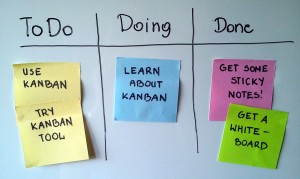A day in Life of a Software Developer
09:00: Check E-Mails, answer some of them, flag some as unread or important.
09:30: Start Working on Project A
09:45: E-Mail from Colleague, interrupt Work immediately interrupt working to read it & answer it.
09:55: Working on Project A
10:10: A Colleague comes to your Desk and has a question
10:20: Back to Project A…
10:40: Phone Rings, another Colleague has a Questing to another Project
10:45: Back to Project A…
11:00: Meeting
12:30: Lunch
….
Do you know Days when you get Home after several Hours of work and ask yourself what you really have archived? Or you feel guilty because you have the feeling that you should have get more done that day? Laying in Bed, thinking about your next days Tasks?
What’s the Problem with Distractions, and Multitasking?
Software Development is a quite complex Task that requires Focus. It takes some Time to get into the Project Environment and to really understand what the Task or the Problem is. Maybe you know Situations where you were think hard about a Problem, and then BANG the phone rings and the bubble over your head bursted. After a 2 Minute call you try to remember of what you thought before and it takes a lot of time to get back into it.
Even if multitasking let’s us feel good – our Brain isn’t very good at it. Usually Multitasking takes more Time to get things done then doing one after another!
If you focus on one Task you can use your full Brain-Power to get into it and to get it done. When you really focus on a Task you feel how you get in a Zone where you work productively and make progress.
Every time when a Distraction occurs your Brain has to switch Focus. This costs Power and takes time. Over the Day you feel more and more exhausted and focussing on a Tasks gets harder.
The big Task Mountain
Do you know this Situation: You are assigned to a big and complex Task, you start working on it but again and again you drift off the another Task that seems more important?
In this Situations our Brain tends to Procrastinate: http://webstandardssherpa.com/reviews/breaking-the-perfectionism-procrastination-infinite-loop/
If we decompose a big Task into smaller ones it becomes much easier to get an Overview and to get started. You can set smaller goals, see faster results and often the Task doesn’t seem to be as complex anymore.
Kanban to the Rescue

As we’ve seen – Multitasking may not be as efficient as we think. Much Work in progress (WiP) forces you also to switch Context more often, but how to Manage all those smaller Task’s?
Kanban is a Part of Lean Software Development. Kanban is a tool to reduce Work in Progress and to visualise you Workflow.
Here’s an Article of Kanban in action: http://scn.sap.com/community/data-warehousing/bw/blog/2012/02/17/how-our-sap-bw-team-uses-kanban
Kanban is simple to understand and all you need are Post-It’s, a Whiteboard or Online-Tools like Jira Agile or KanbanFlow.
Tomato, help me focussing
Focus is the key to efficiency – but how can I get focussed? Try this: Disable your Mail & Phone notifications, select a Task to Work on and set a Timer for 25 Minutes. After 5 Minutes you start your next 25 Iteration. After you completed 4x 25 Minutes Blocks take a longer break. Sounds crazy? Maybe, but the Pomodoro technique works.
You can track how many Pomodoro’s you complete per day / week and measure how much of focussed work you’ve done. Don’t worry if you have 5 or less Pomodoro’s / day at the beginning. It takes some discipline to resist all the Things with that your brain will come up to prevent you from focussing like checking you Mobile, Facebook, WhatsApp or whatever. But when you get trough this you will see soon results on how much more Stuff get’s done!
Try yourself how many Pomodoro you can complete per day / week without felling to exhausted. It seems like our brain is like a muscle – if it’s overused it will end up in a hangover.
But hey, i don’t have an office – I get interrupted all the time by my colleagues!? Talk to your colleagues and explain them how they help theirselves be reducing the distractions. Ask your colleagues to send E-Mails instead and check regularly for important Task. You don’t have to read & answers all you Mails immediately, often it’s more effectively to batch E-Mail reading / answering. Respond only to urgent Mails immediately.
Your colleagues will be exited about how much more value you can deliver!
Conclusion
Smaller Tasks, Kanban and the Pomodoro technique are just 3 of multiple tools & techniques that help me to get stuff done more effectively and to keep work & life balanced. I use kanbanflow.com, because it’s simple to use an has a builtin Pomodoro Timer.
I would love to hear which tools & techniques you use to work effectively and focussed!
This Article @SAP Community Network